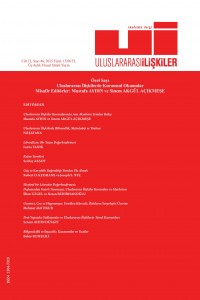Uluslararası İlişkilerde Bilimsellik, Metodoloji ve Yöntem
Abstract
Uluslararası İlişkiler, sadece kuramsal açıdan değil, bilim felsefesi anlayışı konusunda da derin fikir ayrılıkları yaşayan bir disiplindir. Öyle ki, epistemoloji, ontoloji ve metodoloji konularında yaşanan anlaşmazlıklar Uluslararası İlişkilerin disiplin olma özelliğini dahi sorgulatmaktadır. Bu makale, Uluslararası İlişkilerde özellikle metodoloji ve yöntem konularında yaşanan tartışmaları özetlemeyi, metodolojiyle ilgili kavramları açıklığa kavuşturmayı ve metot konusuna faydacı bir bakış açısı getirmeyi hedeflemektedir. Rudra Sil ve Peter Katzenstein, analitik uzlaştırmacılık (analytic eclecticism) yaklaşımları ile farklı bakış açılarının kuram ve epistemoloji gibi konularda anlaşmadan da birbirlerini tamamlayabileceğini, dünya siyasetini anlamlandırabilmek için faydacı bir yaklaşım kullanmanın gerekli olduğunu iddia etmektedirler. Makale, bu uzlaştırmacı yaklaşımın araştırma metotları konusunda da kullanılabileceğini terörizm çalışmalarından örneklerle göstermektedir.
Scientificity, Methodology and Method in International Relations
Abstract
International Relations is a highly divided discipline regarding not only theory but also philosophy of science. Thus, it is often questioned whether the discipline is so divided in epistemology, ontology and methodology is no longer a discipline. This article seeks to clarify the major concepts used in methodology, summarize the main debates in the discipline and to bring a pragmatic approach to research methods in international relations. In their research approach called analytic eclecticism, Rudra Sil and Peter Katzenstein argue that different theories and paradigms do not need to agree on everything to complement each other’s weaknesses. Instead, we need the best of all worlds to understand and explain the complex phenomena that take place in world politics. This article argues that this eclectic approach can also be used in research methods and demonstrates how pragmatism has improved terrorism studies
Details
| Other ID | JA38DB42JE |
|---|---|
| Journal Section | Research Article |
| Authors | |
| Publication Date | September 1, 2015 |
| Published in Issue | Year 2015 Special Issue: Theoretical Readings in International Relations |

